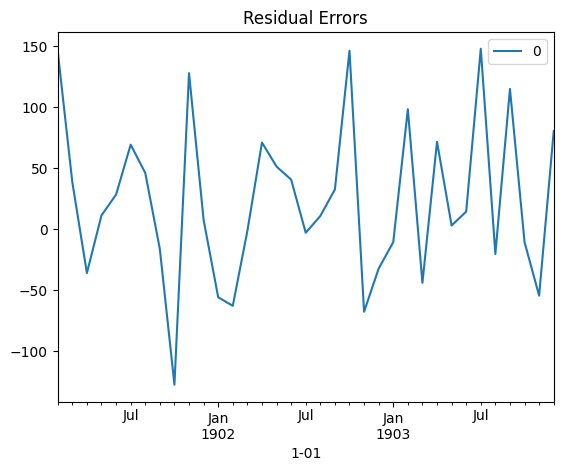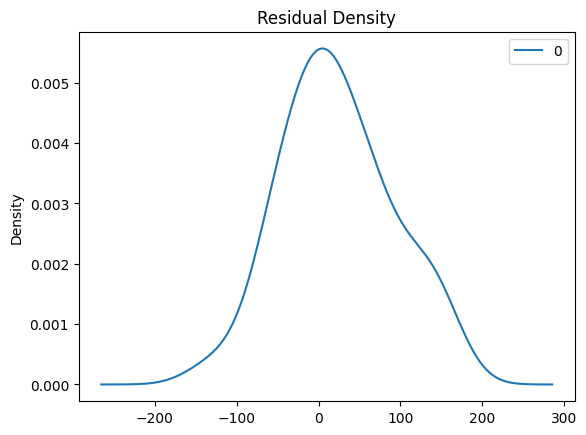Arima-1
Fri 14 November 2025
from pandas import read_csv
from datetime import datetime
from matplotlib import pyplot as plt
from pandas.plotting import autocorrelation_plot
from pandas import DataFrame
from statsmodels.tsa.arima.model import ARIMA
# Define the parser function
def parser(x):
return datetime.strptime('190' + x, '%Y-%m')
# Read the dataset
series = read_csv(
'shampoo-sales.csv',
header=0,
parse_dates=[0],
index_col=0,
date_parser=parser
)
# Uncomment the following lines to explore the data
# print(series.head())
# autocorrelation_plot(series)
# series.plot()
# plt.show()
# Fit the ARIMA model
model = ARIMA(series, order=(5, 1, 0))
model_fit = model.fit()
print(model_fit.summary())
# Plot residual errors
residuals = DataFrame(model_fit.resid)
residuals.plot()
plt.title("Residual Errors")
plt.show()
residuals.plot(kind='kde')
plt.title("Residual Density")
plt.show()
print(residuals.describe())
SARIMAX Results
==============================================================================
Dep. Variable: 266.0 No. Observations: 35
Model: ARIMA(5, 1, 0) Log Likelihood -191.610
Date: Sun, 24 Nov 2024 AIC 395.219
Time: 21:38:34 BIC 404.377
Sample: 02-01-1901 HQIC 398.342
- 12-01-1903
Covariance Type: opg
==============================================================================
coef std err z P>|z| [0.025 0.975]
------------------------------------------------------------------------------
ar.L1 -0.9061 0.226 -4.015 0.000 -1.348 -0.464
ar.L2 -0.2389 0.248 -0.962 0.336 -0.726 0.248
ar.L3 0.1150 0.271 0.425 0.671 -0.416 0.646
ar.L4 0.3196 0.333 0.960 0.337 -0.333 0.972
ar.L5 0.3913 0.211 1.858 0.063 -0.021 0.804
sigma2 4363.6373 1140.860 3.825 0.000 2127.592 6599.683
===================================================================================
Ljung-Box (L1) (Q): 1.95 Jarque-Bera (JB): 0.29
Prob(Q): 0.16 Prob(JB): 0.86
Heteroskedasticity (H): 1.39 Skew: 0.19
Prob(H) (two-sided): 0.60 Kurtosis: 2.76
===================================================================================
Warnings:
[1] Covariance matrix calculated using the outer product of gradients (complex-step).
/tmp/ipykernel_659003/2675072287.py:13: FutureWarning: The argument 'date_parser' is deprecated and will be removed in a future version. Please use 'date_format' instead, or read your data in as 'object' dtype and then call 'to_datetime'.
series = read_csv(
/home/rajaraman/miniconda3/envs/ml312/lib/python3.12/site-packages/statsmodels/tsa/base/tsa_model.py:473: ValueWarning: No frequency information was provided, so inferred frequency MS will be used.
self._init_dates(dates, freq)
/home/rajaraman/miniconda3/envs/ml312/lib/python3.12/site-packages/statsmodels/tsa/base/tsa_model.py:473: ValueWarning: No frequency information was provided, so inferred frequency MS will be used.
self._init_dates(dates, freq)
/home/rajaraman/miniconda3/envs/ml312/lib/python3.12/site-packages/statsmodels/tsa/base/tsa_model.py:473: ValueWarning: No frequency information was provided, so inferred frequency MS will be used.
self._init_dates(dates, freq)


0
count 35.000000
mean 23.199894
std 67.055482
min -127.746544
25% -18.432914
50% 11.215406
75% 70.106933
max 147.928105
Score: 0
Category: arima